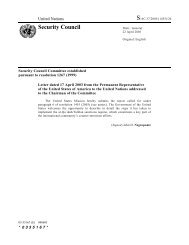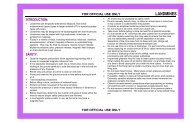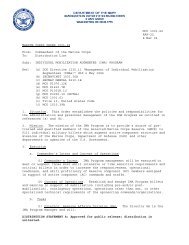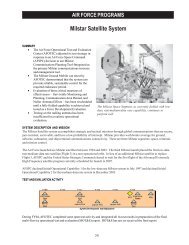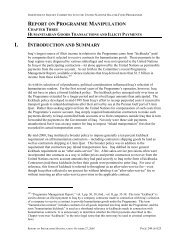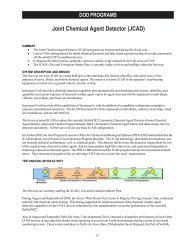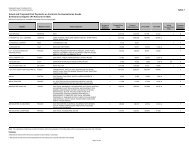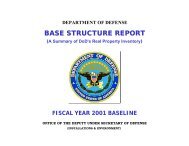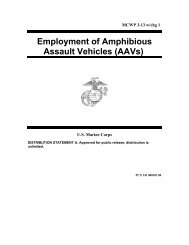The OMB Circular A-76 Policy - GlobalSecurity.org
The OMB Circular A-76 Policy - GlobalSecurity.org
The OMB Circular A-76 Policy - GlobalSecurity.org
Create successful ePaper yourself
Turn your PDF publications into a flip-book with our unique Google optimized e-Paper software.
CRS-29<br />
ability to protect its national security mission. <strong>76</strong> One example of where the use of<br />
outsourcing has been questioned is with the Navy’s decision to privatize weapons<br />
handling at a half dozen military bases, including Seal Beach Naval Weapons<br />
Station, one of the nation’s largest munition depots.<br />
Critics of the Navy’s efforts to privatize weapons handling believe that national<br />
security interests are being compromised for the “promise” of greater efficiencies and<br />
costs savings. Some critics believe that weapons handling is a poor choice for<br />
outsourcing efforts because (1) safety is being compromised, since private<br />
contractors (through their own admission) will not subject their workers to the same<br />
level of education and training requirements as federal workers; (2) the threat of<br />
strikes and work stoppages, prohibited by federal workers, could damage the<br />
military’s operational capabilities; (3) federal workers take oaths to uphold the<br />
national interest, while private contractors do not; and (4) costs and efficiency will<br />
govern contractor business decisions, potentially replacing loyal, experienced, and<br />
higher paid federal workers with disloyal, inexperienced, and lesser-paid contract<br />
workers. 77<br />
Are <strong>The</strong>re Alternatives to <strong>OMB</strong> <strong>Circular</strong> A-<strong>76</strong>?<br />
<strong>The</strong>re is general agreement that the process takes too long. As reported earlier,<br />
GAO reports that multi-function studies conducted since 1991 have taken about 30<br />
months, on average. 78 Alternatives to the policy may prove more time-efficient and<br />
cost-effective.<br />
Currently, the Defense Resources Board (DRB) has required DOD and the<br />
military services to plan for achieving 11.2 billion dollars in savings, by the year<br />
2005, using the managed competition process as outlined in <strong>OMB</strong> <strong>Circular</strong>-A <strong>76</strong><br />
policy. However, one alternative to the <strong>Circular</strong>, now approved by the DRB, may<br />
represent a fundamental shift in DOD’s outsourcing policy. By the end of this year,<br />
DOD is expected to issue new guidelines which will outline how military services<br />
can modify federal jobs and keep them without having to conduct managed<br />
competitions. This alternative would give military services the authority to<br />
independently pursue other alternatives to reach the same projected costs savings;<br />
each military service would be free to explore other ways to re-engineer its<br />
workforce, but be held responsible for meeting the savings goal. Although giving the<br />
military services more flexibility, critics are concerned that, without some<br />
cost/benefit analysis, outsourcing decisions will be made arbitrarily, absent of any<br />
competitive process. 79<br />
<strong>76</strong><br />
Friel, Brian. “Depot Managers Protest Outsourcing.” Government Executive, September<br />
21, 1998.<br />
77<br />
“Navy to Seek Private Bids for Weapons Handling.” Los Angeles Times, Part A, Mar. 13,<br />
1999.<br />
78<br />
Ferris, Nancy. “Targeting Jobs.” Government Executive. December 1999, p. 6.<br />
79<br />
New DOD Outsourcing Guidelines. December 16, 1999. Available on Military Report<br />
website, [http://www.militaryreport.com/].




